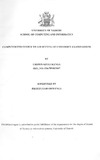| dc.description.abstract | Kenyan university examinations offices depend on external examiners report as well as internal
examiners professionalism to get quality examination questions. To improve the quality of teaching and
learning, examiners must set good questions to test the students in the examinations. Tracking previously
examined questions is important if examiners want to improve on the quality of examinations. However, it
is not practically possible for the examiner to remember all the questions previously examined. When
setting or moderating an examination, it becomes difficult to know if the questions presented in the
examination have been used in a past examination, which topics were examined and difficulty levels that
were tested. There is a possibility therefore, for questions to be recycled from one semester to the next.
This problem is more common in academic programmes where lecturers have to examine the courses they
teach.
The purpose of this study was to investigate re-using of examination questions in Kenyan universities. The
study was conducted in a sample of 501 respondents selected from both private and public university
students and their internal examiners. Data was collected from the respondents using semi structured
questionnaires and a review of past examination papers. Data was then summarized and analyzed using
statistical charts.
The study found out that fifty eight per cent (58%) of students sitting for a university examination
anticipate that they will find recycled questions while fifty four per cent (54%) of internal examiners
admitted that examination questions are being recycled. A system was then designed to help examiners
set examinations. The system is used to create questions for given programme, course and testing a given
topic and difficulty level. The questions are then stored in the database from where they will be selected
to be used in the examination .If a question has been used in a previous examination, its counter
increments by one (1) and will show the date when it was lastly used. By studying this information
presented about the question, the examiner can choose or ignore the question(s).This way, the examiner
can make an informed decision to set a quality examination that covers topics, difficulty levels and has
not been used recently. | en |

